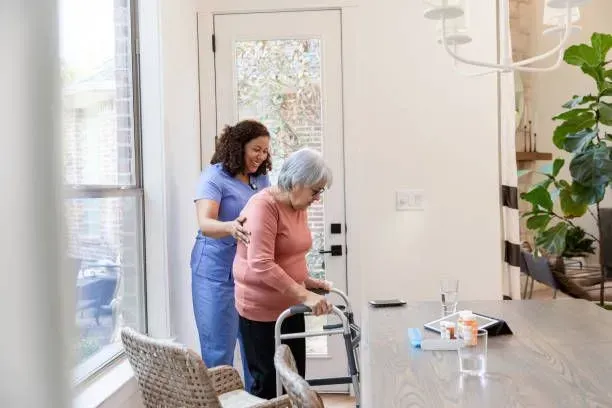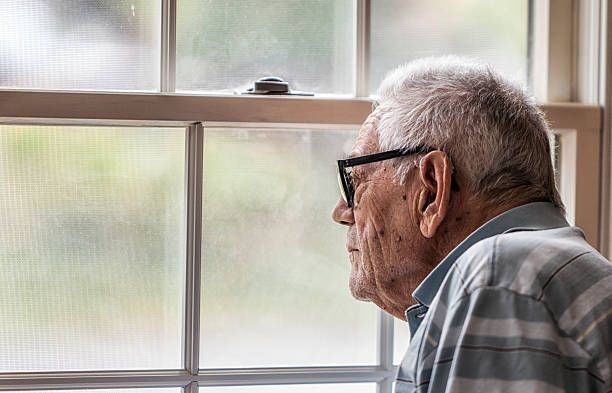6 Communication Strategies for Alzheimer's and Dementia Patients
6 Communication Strategies
for Alzheimer's and Dementia Patients
At 7 Day Home Care, we recognize the profound value of having home health aides who are highly skilled in communication strategies for Alzheimer’s and dementia care. Effective communication is pivotal in reducing confusion, agitation, and distress in individuals with cognitive impairments. Our experienced aides employ tailored techniques, such as using simple language, maintaining eye contact, and incorporating visual cues, to enhance understanding and cooperation. They are trained to be patient listeners, providing reassurance and fostering a sense of security. By utilizing these specialized strategies, our aides not only improve the daily interactions and quality of care but also significantly contribute to the emotional and psychological well-being of our clients, ensuring a more harmonious and supportive home environment. 7 Day Home Care is licensed by the New York State Department of Health to provide home care services in Manhattan, Queens, Brooklyn, Nassau County, and Suffolk County, New York.

Are You Searching for Home Health Aides Near Me
with Experience in Alzheimer's and Dementia Care?
7 Day Home Care is committed to delivering specialized Alzheimer's and dementia care services in Brooklyn, Manhattan, Queens, Nassau County, and Suffolk County. Effective communication plays a vital role in providing compassionate care and maintaining a meaningful connection with patients. In this article, we share ideas to empower home health aides and caregivers with the knowledge to communicate effectively with individuals living with Alzheimer's and dementia.
The Significance of Effective Communication
for Alzheimer's and Dementia Care
Effective communication is crucial in Alzheimer's and dementia care, promoting understanding, reducing distress, and enhancing overall well-being. It enables caregivers to build trust, establish rapport, and provide personalized support to patients.
According to the Alzheimer's Association, around 5.8 million Americans are living with Alzheimer's, and by 2050, this number may rise to nearly 14 million. Studies show that individuals with dementia often experience communication impairments, including difficulties in understanding and expressing themselves. Non-verbal communication, such as facial expressions and gestures, becomes increasingly important as verbal communication skills decline.
Strategies for Effective Communication
for Alzheimer's and Dementia Care
- When communicating with individuals with Alzheimer's or dementia, using simple and clear language, speaking slowly, and allowing ample time for the person to process information are crucial strategies. These approaches can help facilitate better understanding and reduce confusion or frustration. By using uncomplicated words and phrases and allowing for extended response time, you can create a more supportive and conducive communication environment, fostering a sense of comfort and connection for those experiencing cognitive challenges.
- For individuals with Alzheimer's or dementia, maintaining eye contact, displaying positive body language, and showing empathy and understanding are essential components of effective communication. Engaging in eye contact helps establish a connection and fosters a sense of trust and reassurance. Displaying positive body language, such as a warm smile or a gentle touch, can convey a sense of comfort and support, promoting a feeling of emotional security. Demonstrating empathy and understanding through your words and actions can help alleviate any feelings of confusion or distress, creating a more positive and meaningful interaction for individuals coping with cognitive challenges.
- Encouraging reminiscence and storytelling can be an effective way to engage Alzheimer's and dementia patients and stimulate memory recall. Creating a conducive environment that encourages the sharing of personal stories and experiences can help evoke positive memories and foster a sense of connection and identity. By actively listening to their narratives and showing genuine interest, you can create a supportive and inclusive space that promotes emotional well-being and a feeling of validation. Reminiscence therapy can serve as a powerful tool for enhancing cognitive function and emotional resilience, providing individuals with a sense of comfort and joy as they revisit cherished moments from their past.
- Validating the emotions and experiences of Alzheimer's and dementia patients is crucial, even if their perception of reality differs from yours. Acknowledging their feelings and experiences without judgment or correction can help foster a sense of trust and emotional security. By demonstrating empathy and understanding, you create a supportive environment that promotes a feeling of reassurance and validation, allowing individuals to feel heard and understood. This approach can help reduce feelings of frustration or confusion and promote a more positive and meaningful connection, enhancing the overall well-being and quality of life for individuals coping with cognitive challenges.
- Utilizing visual aids, such as photographs or labeled objects, can significantly support communication and memory for individuals with Alzheimer's and dementia. These visual cues serve as powerful tools for enhancing comprehension and aiding in memory recall. By incorporating familiar images, labeled items, or memory-triggering photographs, you can help individuals better connect with their surroundings and evoke positive memories. Visual aids can serve as effective prompts during conversations and activities, fostering a more engaging and meaningful interaction while promoting a sense of familiarity and comfort.
- Establishing a calm and soothing environment is crucial when caring for individuals with Alzheimer's and dementia. Minimizing distractions and creating a quiet, well-organized space can help reduce feelings of agitation and confusion. By maintaining a peaceful atmosphere, you can promote a sense of security and comfort, fostering a more relaxed and conducive setting for communication and engagement. Consider incorporating familiar and comforting elements, such as soft lighting, soothing music, and familiar objects, to create a space that evokes a sense of tranquility and emotional well-being for individuals experiencing cognitive challenges.
7 Day Home Care Provides Experienced Home Health Aides
Near You for Alzheimer's and Dementia Care
At 7 Day Home Care, we understand the importance of effective communication when caring for individuals with Alzheimer's and dementia. We are dedicated to ensuring that clients with Alzheimer's and dementia receive the most suitable and compassionate care through our client-caregiver matching process. We meticulously pair clients with caregivers who possess the necessary expertise and experience in providing specialized care for individuals with cognitive challenges. Our rigorous matching process takes into account not only the specific care requirements of each client but also their unique personalities, preferences, and interests. By fostering meaningful connections and promoting a sense of trust and familiarity between clients and caregivers, we strive to create a supportive and enriching environment that enhances the overall well-being and quality of life for those living with Alzheimer's and dementia. At 7 Day Home Care, we are committed to providing personalized care that prioritizes empathy, understanding, and respect, ensuring that our clients receive the highest level of attention and support from our Home Health Aides who are dedicated to their comfort and well-being.
More, 7 Day Home Care is dedicated to providing person-centered care for individuals living with Alzheimer's and dementia. Our approach revolves around understanding and honoring each client's unique preferences, abilities, and personal history. We prioritize creating a supportive and nurturing environment that promotes a sense of familiarity and comfort, tailored to meet the specific needs of individuals with cognitive challenges. By fostering meaningful connections and engaging in personalized activities that align with their interests and capabilities, we strive to enhance their overall well-being and quality of life. Our compassionate caregivers, Home Health Aides, and Personal Care Aides undergo specialized training to ensure they can provide the highest standard of care, again emphasizing empathy, patience, and understanding in every interaction. At 7 Day Home Care, we are committed to supporting individuals with Alzheimer's and dementia, promoting their dignity, independence, and emotional security every step of the way.
By implementing successful strategies, we strive to provide compassionate and tailored home care in Brooklyn, Manhattan, Queens, Nassau County, and Suffolk County, New York. Our dedicated Home Health Aides are equipped with the knowledge and skills to build meaningful connections, reduce distress, and enhance the quality of life for our patients and their families. Call 516-408-0034 to learn more about our in-home care services near you in New York.
Brian Callahan
7 Day Home Care










